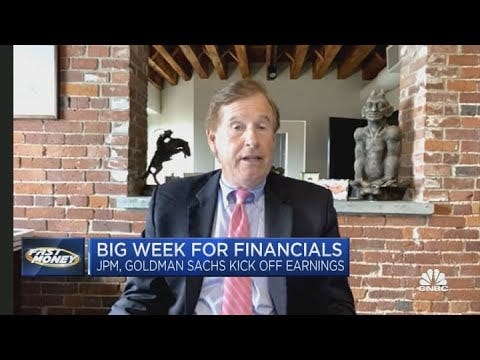Excellent Bank Earnings, Retail Sales, Energy Strength Boost Markets!
‘In theory there is no difference between theory and practice. In practice there is.’ Yogi Berra
Many companies in the equity markets trade for a very high price, especially the market leaders. There are a few different approaches to valuing assets, but in nearly every case, they involve the use of interest rates. The valuation calculation always involves interest rates in the denominator. The ten year treasury yield is used as a proxy for interest rates, and it currently sits near 1.50%. On a theoretical basis, one could make the argument the 1.50% rate is essentially zero. In any mathematical equation, when zero is in the denominator, the answer choice is either zero, indeterminate, or infinity. In evaluating the value of a stock, we know the first two statements are certainly not correct. A company which produces cash is worth something. If it is worth something, it can be determined, or at least estimated. Theoretically, and please follow carefully, the only answer for the valuation of any cash producing company when interest rates are zero is infinity. Why do I bring this up?
Factually, interest rates are 1.50% for a ten year treasury note. So, by extension, the more earnings power a company has, the greater it’s value. It makes perfect sense for massive entities which lead the markets to be valued at levels not previously seen. Low and behold, we now have multi trillion dollar valuations. Remember, interest rates at or near zero, values approach infinity. What about companies which don’t have a great deal of earnings power? Should they be worth infinity? As long as interest rates stay near zero, their fans can argue, sure they are worth X. Don’t have much sales, no problem, look at it’s growth potential. Of course, there is the one problem with this argument, and the entire line of thinking. What happens when interest rates move higher and away from zero?
The obvious answer, and correct by calculations, is asset values will go down. It is for this reason investors are especially interested in what the Federal Reserve does with it’s interest rate outlook and target. We know Mr. Powell will begin reducing the rate of bond purchases in about a month. When this happens, interest rates should start to move higher. It is why we see the constant push and pull in the markets around the fluctuation of interest rates. When rates drift higher, highly valued entities sell off. The opposite generally holds true when rates get pushed lower. Of course, as Yogi so elegantly stated, practice is far different than theory. There are many company’s one can look at in the market and only shake your head at their current price. A more level headed approach is to consider what will happen when interest rates move to two, three, or four percent, and maybe higher?
In the markets, a surprising retail sales number helped investor sentiment as the week closed. The largest banks reported big profits as the various lines of business were quite strong overall. Large releases of reserves, plenty of fees from IP-O's and merger and acquisitions, a little net interest margin, and good credit quality all were factors in the results. In the energy space, oil prices continue to march higher. Constant demand in Asia and Europe and minimal solar, wind, and coal supply are moving sourcing for electricity towards carbon based approaches. Energy followers know when the wind doesn’t blow and the sun doesn’t shine, practical people are very thankful for old reliable, oil based feed stock.
Along those lines, in California, the huge oil spill in Huntington Beach again raises the issue of carbon based supplies versus alternative energy sources. With the massive backup of ships at the Long Beach and Los Angeles Ports, the tightness of supply chains is another issue critics of the current administration mention as proof of incompetency. No comment, but you know where I stand.
In another interesting situation which I thought was worth mentioning, the Wall Street Journal ran a story alleging corruption across the judicial landscape. In courts across the land, the scales of justice represents the balance between truth and fairness. Apparently, those supposedly qualified to make decisions on outcomes forgot their ethical obligations to the public. Mr. Munger has repeatedly talked about incentives driving behavior. In these cases, the quote ‘Eat my bread, sing my song’ remains the dominant motive. Next week, the earnings parade will continue hot and heavy with powerhouses Netflix, Chipolte, Verizon, AT&T, and Johnson and Johnson headline the show.
On that note, if you know of anyone who could use our investment advice, please don’t be afraid to reach out or pass their name along.
If you would like a free consultation regarding your portfolio, click here to set one up!
Thank you for reading the blog this week, and if you have any questions about investing, please email me at information@y-hc.com.
Interested in finding out your investment style? Take an investment assessment from Positivly!
Yale Bock, Y H & C Investments, its clients, and the family of Yale Bock have positions in the securities mentioned in the blog, Investing in securities involves risk and the potential loss of ones principal. Past performance is no guarantee of future results. All investment decisions should be considered with respect to ones risk tolerance, return objectives, liquidity needs, tax considerations, and one’s overall financial situation. The fact that Yale Bock has earned the right to use the CFA designation does not mean Y H & C Investments will outperform broad market indexes.



